DAVE'S DIARY - 26 JULY 2009 - MATT JOE GOW INTERVIEW
FROM DEAD LIVERS DEAD LEAVES SPROUT
"Up on the hill, back on the land/ an old gray house, it sits/ my mama don't live there no more/ my father left town years before /some memories ain't good." - Up On The Hill - Matt Joe Gow.
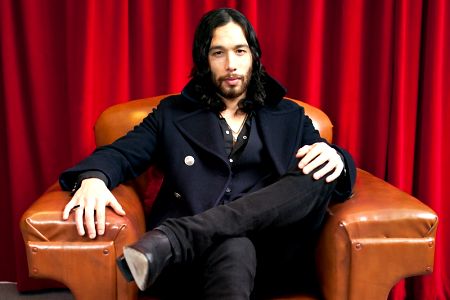 |
Matt Joe
Gow makes one thing clear from the outset - he didn't purloin his band
name from the iconic group co-founded by former pedal steel guitarist
Brendan Mitchell.
Gow had already named his Melbourne band The Dead Leaves when Mitchell
exited seventies outlaws The Dead Livers to join the expatriate Kiwi's
road band.
"I didn't discover Brendan had played in a band called the Dead Livers
until after he joined us," Gow told Nu Country TV on the eve of the
Dead Leaves release of its CD The Messenger.
"We didn't steal the name from him. There were posters of him playing
with the Dead Livers in his house."
But nothing to indicate Mitchell played in the house band for Australian
production of The Best Little Whorehouse In Texas or wrote Ballad
Of A Dead Liver two decades before having a liver transplant.
"It's difficult to find pedal steel players at the best of times,"
Gow revealed.
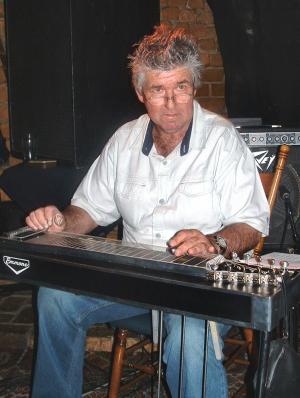 |
"When
I put the word out this guy turns up on my doorstep. He said he could
play some pedal steel and was little older than me but that didn't
bother me. I wanted to just get the band together and get the songs
out there. He came on board. It was really interesting, me on acoustic
guitar, him on pedal steel and a drummer. People were really surprised
to see that line-up in some of these rock'n roll bars. The standard
line-up was a couple of electric guitars, bass and drums. It probably
gave us an edge at the start when we weren't that tight." The parallels with Mitchell's pioneer band now celebrating 31 years in the saddle, are not just cosmetic. Mitchell's hombres blazed a trail by writing about life on the edge - a true alternative to peers raised on covers who searched U.S. road maps for song titles. |
They lived
the life they wrote and sang about - fast women, hard liquor, soft drugs,
footy and cricket, drudgery of riding trains to work, heading to the bush
and coast and ultimate mystical mama song, Holy Mary.
It scored them support roles on tours by artists diverse as Leon Russell
& Newgrass Revival, Amazing Rhythm Aces and Charley Pride.
FROM DUNEDIN ACADEMIA TO BAR WARS
"Spent most of my life it seems/ in and out of bars/ from one side of the world to the other, child." - At The Bar - Matt Joe Gow.
But Gow,
born in New Zealand music mecca Dunedin, tilled a broader geographical
terrain for his song sources.
The singer hit the road, visiting his ancestral roots in Asia, and living
in Canada and U.S as his father leapfrogged continents in his professorial
pharmaceutical pursuits.
"My father is a professor (in pharmaceuticals) but still sings in
a choir," Gow confessed.
"It's very different to what I do."
Well not exactly - Gow studied philosophy at university in New Zealand
before hitting his lost highway.
The Gow careers may be vast contrasts but not flight patterns - they travelled
frequently in the patriarch's academic research.
Matt spent a year living in Syracuse in the Finger Lakes area of New York
State with his family and returned there.
But so far his GPS has not zeroed in on Austin or Nashville.
Gow recorded two EPS - one in Canada and another in England - as he returned
to the scene of his rhyme and further afield as an older explorer.
"My mum and dad put me into learning classical piano when I was five
years-old," Gow recalled.
"That gave me a taste of performing on stage and got me more used
to it."
FLAMING
YELLOW HILLS
"If the rivers run dry/ lead you to the rusted beach/ that lie beneath
the rising tide/ let it be you who lay me down/ from the flaming yellow
hills/ through the valley of our scars." - Land Is Burning - Matt
Joe Gow.
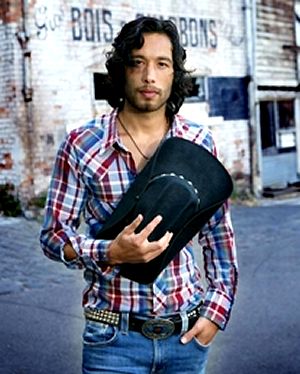 |
New
Zealand sired country acts diverse as Keith Urban, Midge Marsden,
P.C. Caulton & The Pick-Ups, Ritchie Pickett's In-Laws, Murray
Grindley aka Monte Video and 33 South, nee The Tourists. There was also Ray Columbus's famed TV show That's Country and Christchurch born star maker, promoter-publisher and former Atlantic Records Nashville CEO Barry Coburn. That was when country became cool in the seventies. But Gow emerged from an indie rock scene in a city - home to Flying Nun record label that hosted The Chills and Straitjacket Fits. "Dunedin was known as place where bands could really make a difference," Gow recalled. |
"There was a vibe in air that you can still make it."
So Gow chose
music ahead of sport at an all boys' school after taking up guitar at
13 and blending music and poetry.
"I left home straight after university after studying philosophy,"
he added.
"I travelled through Asia and China, my grandfather was from China,
through Europe then back to Canada where I also lived as a child in Toronto.
I went to Vancouver. My father does a lot of research. It was where I
developed my love for Americana and alt.country."
Gow, like predecessor Urban, chose burning midnight oil in gigs rather
than menial tasks many peers revert to as a means of keeping wolves from
doors.
"It was more about getting out and playing," Gow confessed.
"I just played four or five days a week, getting my chops up. I didn't
do any other job."
It meant road testing original material while connecting with audiences
with nocturnal covers.
"I don't play covers I don't like," says Gow whose album has
only one revamp - Grant Lee Phillips Come To Mama, She Say.
"I played material by Pink Floyd, Jackson Browne, Eagles and Townes
Van Zandt."
His previous band Tearlighter released an EP of original songs in Canada
and another in England.
"In England there were not opportunities, energy or connection -
it was too far from home.
The band fell apart. Melbourne is like home. We're a Melbourne band. Melbourne's
done a lot for us."
His trio morphed into a quartet with Croydon reared guitarist Andrew Pollock,
bassist Kane Borlase and drummer Joel Witenberg.
By now Mitchell, also pedal steel guitarist in Andre Camilleri's Broken
Hearts band, had walked the plank.
NASH CHAMBERS
"Now you're seized up like a dirty old machine/ got a heart falling apart at the seams." - At The Seams - Matt Joe Gow
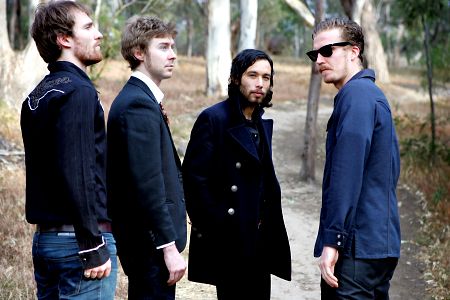 |
Gow signed
with Nash Chambers label Essence.
He joined sister Kasey and her singing spouse Shane Nicholson and Troy
Cassar-Daley in Michael Gudinksi's Liberation stable.
Nash became album producer and hired father Bill on lap steel for the
NSW Central Coast tracking.
Session serfs included Michel Rose on pedal steel, fiddler Mick Albeck,
drummer John Watson and Huckleberry Swedes producer Jim Moginie on guitar,
mandolin, harmonium and organ.
Gow used Sing Sing Studio in inner eastern Melbourne suburb Richmond for
his vocals, guitar and harmonica.
"We tinkered around with songs, arranging vocal harmonies,"
said guitarist Pollock, joined in the studio by bassist Borlase.
"I also track my harmonica live," Gow added. "It's fundamental
to the song."
A welcome surprise is Newcastle singer-songwriter Catherine Britt, discovered
and produced by Bill Chambers, before having her wings singed by the Nashville
fame flame.
Britt, 23 and a three-album veteran, added her vocals to Things Fall
Apart and At The Seams.
So back to the songs - many torn from Gow's recent back pages.
"Some songs are almost completely autobiographical, they vary from
song to song," Gow confessed of finale Up On The Hill.
"I write around an idea, an emotion I want to express. I draw on
personal experiences and fill in the other parts. That's closest to being
about me as any other song."
MAMA, TRAINS AND RIVERS
"Steady train passing by my window/ shakes the very floor boards/ ain't sleeping though, it ain't the noise." - Steady Life - Matt Joe Gow.
OK what about
the trusty template of songs about mama, trains and rivers, long given
a workout by former convict country star Merle Haggard, 72 and holding
everything he can?
"Yes, I write about mama, trains and rivers but not just because
they're country staples but because they're close to my heart in terms
of the land and my mother. I tended to live next to trains everywhere
I lived. Even in England I had trains run past my window - but I like
trains."
And there's a wanderlust thread embroidering that Gow fabric.
"My parents still live in Dunedin but they travel a lot and were
a source for my wanderlust songs," Gow confessed.
"They're snapshots of my life. I find best way to write honestly
is to write about your own experiences. It's easy to express that live.
People can see that is coming from somewhere within you. I wanted the
album to have bittersweet sentiment, looking back on things. Not necessarily
depressing - that's quite a common occurrence in country music. Steady
Life, Things Fall Apart and It's Not Hard will have that same
emotion. That's the way I tend to reflect on things. I look back a lot."
But what about the assertive leaving song I Let You Be?
"It's one of the songs on record about letting go of things, that's
on a few tracks," Gow admitted.
"I Let You Be is one of the darker moments on the record -
kind of almost a self loathing song, kind of solitary. It's haunting.
It's also about finding solace. It works out better for both parties.
I tried to use some of the visceral elements. I think there's enough references
to trains in there and heaven or hell."
VIDEOS
"Stood in the doorway, all chipped of paint/ throw up your hands and turn on your heels/ you had the child so you gave a couple years more/ but now it's time, fell it tugging at your sleeve." - Come What May - Matt Joe Gow.
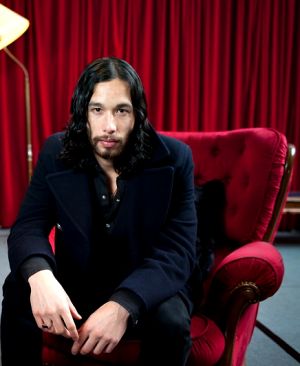 |
Gow
& The Dead Leaves filmed a video for Come What May in
Melbourne. "The music we play and listen to doesn't feature on mainstream stations," Gow explained. |
"I find
it hard to imagine me there and don't see why I should. If it gets there
it won't be from marketing and lots of dollars thrown at it - it will
be there on its own merits under its own steam. We're trying to get to
rural areas - believe there is a big audience out there in regional towns.
Hopefully people enjoy good songwriting and connect with that and come
and see us live."
Pollock agrees.
"We did a support for Pete Murray and played places like Traralgon
and Ballarat and other regional centres," Pollock said.
"You forget how big folk and country music is outside the cities.
There's a lot of loyalty from going out and doing gigs in those towns.
People appreciate the fact you have made the effort to go there - they
have CMC."
And, of course, Nu Country TV in suburbia and southern coastal areas of
Victoria, Queensland, South Australia and pockets of New Zealand.
Nu Country TV airs Come What May in August - check out the show
streamed on the C 31 web page.